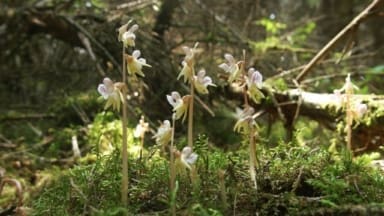
Considered to be one of our rarest plants, the Ghost Orchid (Epipogium aphyllum), was discovered by a member of a member of the Botanical Society of Britain and Ireland (BSBI) and keen amateur botanist, Richard Bate.
First recorded in Britain in Herefordshire in 1854, the Ghost Orchid’s initial identification was remarkably late for a native species, due to its rare and unpredictable appearances. Over the next 170 years, it was recorded flowering in Britain only a few dozen times. In 2009, it was declared extinct after an absence of 22 years, only to reappear a week later. Bate’s discovery earlier this month is the only sighting in the last 15 years and he had searching for the Ghost Orchid for over 30 years.
The Ghost Orchid with its renowned pallid ivory-white colour is extremely elusive. The orchid’s preferred habitat is one of sun-dappled in dark beech and oak woods, which with its diminutive size, pale ethereal appearance, and habit of flowering erratically and sporadically makes it extremely difficult to find. Moreover, the plants only appear above ground for a few days and are at high risk of slug damage, which considering this is the year of the slug for gardeners, makes the find even more extraordinary.
Intriguingly, Ghost Orchids do not depend on sunlight to survive and hence lack chlorophyll. To survive, they depend instead on a type of fungi throughout their life cycle, and only appear above ground to flower and set seed. Flowering is suspected to be linked to exacting weather patterns, where it is thought that they prefer wet springs and cold winters to flower, along with the correct light and moisture levels in the woodland.
Bate’s passion for orchids began as a child when he encountered a Bee Orchid. A dental surgeon by profession, he spends his time seeking free wild orchids in the UK and across the world.
“Knowing that the Ghost Orchid is still here and hasn’t gone extinct in Britain fills me with hope for the future of this species. I am deeply grateful to the BSBI for their unwavering support of botanists like me and for their dedication to studying, recording and conserving Britain’s wild plants. This discovery reminds us that even in the darkest woods, there is always hope,” said Bate.
Professor Ian Denholm, BSBI national orchid expert referee said, “Ghost Orchid has long been the ‘holy grail’ for British botanists. There was a brief flurry of records in the 1960s and 1970s and I was lucky enough to see a single specimen in the mid-1980s. Since then, I reckon only six people have knowingly observed it in the wild in Britain. It is wonderful news that it has reappeared and let’s hope it does again!”
The Ghost Orchid has been declared extinct by Plantlife, shortly after its discovery in 2009 and is currently classed as Critically Endangered on the IUCN red data list, and included under Schedule 8 of the Wildlife and Countryside Act 1981. To ensure its protection, the location of Bate’s treasured find in England has been kept secret.
The BSBI is a charitable organisation promoting the enjoyment, study and conservation of wild plants in Britain and Ireland. They aim to build a diverse community of skilled and enthused botanists; provide data and science to help address biodiversity loss and climate change; and disseminate information to drive a passion for plants. The BSBI Distribution Database holds over 56 million plant records, making it one of the world’s largest biological recording databases.

